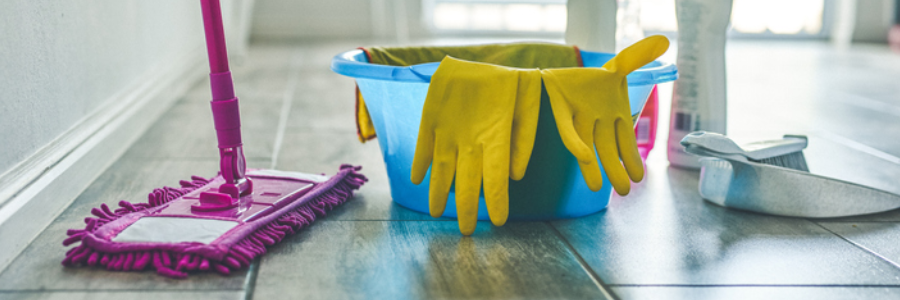
If you are finding it difficult to perform daily chores because of a disability, you might wonder whether your Social Security disability benefits can cover services such as house cleaning.
On the other hand, if you have spent your working life as a house cleaner, you may be asking: Can I qualify for benefits if health problems prevent me from doing such physically demanding work?
Social Security Disability Insurance (SSDI) and Supplemental Security Income (SSI) provide monthly cash benefits and health coverage for people who cannot work due to serious medical conditions. These programs are provide essential support, but they do not pay for in-home help such as cleaning, laundry, or yardwork. Their purpose is to replace lost income rather than cover the cost of particular support services.
As for the second question, the Social Security Administration (SSA) carefully evaluates the demands of your past work when deciding disability claims. This is a crucial factor for house cleaners and others whose jobs require heavy physical labor.
Knowing what disability benefits do and do not cover can help set realistic expectations and strengthen your claim. This article explains why SSDI and SSI do not provide house cleaning services, how house cleaners can qualify for disability, and what other resources may be available if you need help maintaining your home.
Understanding the Limits of Social Security Disability Benefits
Social Security Disability Insurance benefits provide monthly cash payments to insured workers and Medicare coverage after 24 months of entitlement. Supplemental Security Income provides monthly benefits to individuals with limited income and Medicaid coverage.
However, neither SSDI nor SSI pays for personal or domestic services such as house cleaning, laundry, grocery delivery, or yardwork.
Social Security Disability programs are designed to replace lost income, not to fund personal assistance or household maintenance. While the SSA recognizes that disabilities can make daily life difficult, it does not directly cover domestic help.
SSDI for House Cleaners as Workers
House cleaners can qualify for SSDI or SSI when medical conditions make it impossible to perform substantial gainful activity (SGA). Common functional limitations include:
- Difficulty standing or walking for extended periods
- Pain when bending, lifting, or carrying objects
- Fatigue or dizziness interfering with work tasks
If your health conditions prevent you from performing your usual duties, you may meet the SSA’s definition of disability.
The difficulty of house cleaning as past relevant work
The SSA categorizes house cleaning as medium to heavy work, requiring frequent bending, lifting, reaching, and repetitive movements. In simple terms:
- Medium work means jobs that usually require lifting up to 50 pounds at a time and frequently lifting or carrying items that weigh up to 25 pounds. These jobs often involve standing or walking for most of the day.
- Heavy work involves lifting up to 100 pounds at a time and frequently lifting or carrying up to 50 pounds. This level of work usually includes plenty of physical activity such as constant bending, lifting, and moving around.
The SSA uses these categories to decide whether a person’s medical condition prevents them from doing their past work or other types of work. This classification matters because, if they can no longer handle the physical demands of their past work, the SSA must determine whether they can adjust to lighter work.
Rules for applicants age 50 and older
For workers aged 50 and older, the SSA’s Medical-Vocational Guidelines (the “Grid Rules”) make approval easier. Older house cleaners who cannot return to heavy or medium work and lack transferable skills often qualify under these grids, recognizing that transitioning to sedentary jobs may not be realistic.
How the SSA Evaluates Your Ability to Work
In reviewing SSI and SSDI applications, the SSA considers these factors:
Functional limitations that impact house cleaners
Disabling conditions that frequently affect house cleaners include:
- Arthritis, back pain, or joint degeneration
- Shoulder, knee, or wrist injuries
- Asthma or COPD aggravated by cleaning chemicals
- Balance or mobility issues
- Chronic fatigue or medication side effects
The SSA evaluates whether the limitations caused by these medical impairments prevent you from performing your past work or any other full-time job.
The role of medical evidence
Strong medical evidence is essential to be successful in a disability claim. This includes:
- Treatment notes and imaging results
- Functional capacity evaluations
- Physician statements or residual functional capacity (RFC) forms
- Detailed descriptions of your past work duties
A well-documented record helps demonstrate how your condition limits your ability to perform physically demanding work.
Alternatives and Support Options for House Cleaning Services
While SSDI and SSI do not pay for cleaning services, some state Medicaid programs offer Home and Community-Based Services (HCBS) waivers that may include limited chore assistance or in-home help for people with disabilities.
Some local area agencies, disability advocacy groups, and community nonprofits sometimes provide chore assistance or connect individuals with low-cost cleaning services. Here are a few examples:
- The Area 12 Agency on Aging (California) offers an “In-Home Support” program that includes services such as “Homemaker – household support with light cleaning, laundry, shopping, and food preparation” and a “Chore – assistance with mainly outside chores such as weed eating, and raking.”
- The Valley Area Agency on Aging (Michigan) lists “Chore Services” and “Homemaking – an in-home service to maintain a clean, safe and healthy home environment (housekeeping, light meal preparation, laundry, errands)” among their offerings for older adults and persons with disabilities.
- The Arapahoe County Senior Resources (Colorado) website details a “Homemakers” light housekeeping program (general cleaning of kitchens and bathrooms, laundry, etc.) and a “Chore Services” program (major cleaning, organizing, etc.) for older adults and persons with disabilities.
Important caveats
These programs are not part of the Social Security Administration disability benefit system. They are separate community or state/local services (usually under Area Agencies on Aging, Medicaid waivers, or nonprofits).
Eligibility often depends on age (typically 60+), functional need, and sometimes income or resource limits. The available services vary widely by locality (state, county, agency). What is offered in one region may not exist in another.
It is also helpful to remember that once approved for SSDI or SSI, you may use your monthly benefits however you choose, including hiring cleaning help or purchasing adaptive devices to make household chores easier.
For more information about whether a Social Security disability beneficiary can be a caregiver and receive IHSS income, check out our blog article here.
Practical Steps for Applicants and Beneficiaries
If you’ve worked as a house cleaner and can’t keep up with the physical demands due to health problems, applying for SSI or SSDI may provide important support. Here are some practical steps to help you navigate the process with confidence.
Documenting work limitations if you are a house cleaner
When completing your SSA work history forms, clearly describe:
- How many hours a day you had to stand or walk daily
- The heaviest items you carried (e.g., vacuum cleaners, buckets, furniture, garbage bins, etc.)
- Whether you had to bend, kneel, or reach overhead
- Whether you experienced any pain, fatigue, or shortness of breath during tasks
Providing as much detailed information as possible helps the SSA understand why you cannot return to your past relevant work.
If your health prevents you from performing physically demanding work, you may qualify for SSDI or SSI benefits.
The SSA focuses on your ability to work, not your ability to manage household chores. However, for many house cleaners, the physical demands of cleaning are the very reason they can no longer maintain employment. With strong medical documentation and expert representation, you can build a successful claim for disability benefits.
Working with a disability lawyer or advocate
Because the SSA’s rules can be complex, it is wise to consult a Social Security disability attorney or representative who can:
- Gather and submit medical evidence
- Communicate with your doctors
- Prepare legal arguments under the SSA’s Grid Rules
- Represent you at your hearing
If your health problems prevent you from working, whether you’re a house cleaner or in another physically demanding occupation, our team can help.
Contact LaPorte Law Firm for a free consultation to discuss your eligibility for Social Security Disability benefits.
FAQs
No. SSDI and SSI provide cash and health benefits but do not cover personal or household cleaning services.
Yes. If you have a medically documented impairment that prevents you from performing your cleaning duties or other full-time work, you may qualify.
Check your state’s Medicaid HCBS waivers, local disability agencies, and nonprofit programs for chore assistance options.















